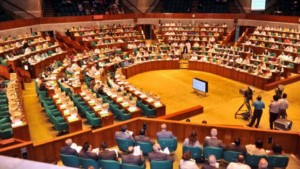A post-budget press conference on the issue of tobacco taxation in the proposed budget for the FY 2018-19 was held Saturday (23 June, 2018) at the VIP Lounge of National Press Club at the initiative of PROGGA and Anti-Tobacco Media Alliance (ATMA) and in association with other anti-tobacco organizations including National Heart Foundation Bangladesh, Dhaka Ahsania Mission, Association for Community Development (ACD), Young Power in Social Action (YPSA), National Anti-Tobacco Platform (NATP) and Tamak Birodhi Nari Jote (TABINAJ). Renowned economist Dr. Qazi Kholiquzzaman Ahmad, Chairman, PKSF and Chairman, National Anti-Tobacco Platform was the chief guest at the event. The special guest was Dr. Rumana Haque, Professor, Department of Economics, University of Dhaka. The press conference was presided over by National Professor Brig. (Rtd.) Abdul Malik, founder and president of National Heart Foundation of Bangladesh. A written statement was presented at the press conference by Nadira Kiron, Chief Reporter ATN Bangla and co-convener of ATMA. Mortuza Haider Liton, Chief Crime correspondent, BDNews24.com and convener of ATMA; Dr. Mahfuzur Rahman Bhuiyan, Grants Manager, Campaign for Tobacco-Free Kids (CTFK) and Prof. Dr. Sohel Reza Choudhury, Head of the Department of Epidemiology and Research, National Heart Foundation Hospital & Research Institute were among others present at the event.
In his speech as the chief guest, economist Dr. Qazi Kholiquzzaman Ahmad said, ‘The consumers of low segment cigarettes are the highest in Bangladesh. So, my demand to our policymakers will be to set the price of low slab cigarettes at minimum Taka 35 per 10 sticks in the final budget.’ He also urged the government to reinstate the 25 percent export duty on processed tobacco. Dr. Rumana Haque, the special guest of the event, said, ‘The proposed budget left the existing four price slabs of cigarettes untouched. As a result, the consumers will get opportunity to switch to lower brands and vice versa which will appear as an obstacle in achieving a tobacco-free country by 2040.’ Terming the promotion of tobacco export as ‘unethical’, National Professor Brig. (Rtd.) Abdul Malik said, ‘To encourage the people of other countries in consuming our cheap tobacco products is unethical. Our vision is to build not only a tobacco-free Bangladesh, but also a tobacco-free world.’
Speakers at the press conference pointed out that the proposed budget for the 2018-19 does not reflect anti-tobacco organizations’ demand for bringing down the number of price slabs into two from the existing multi-tier taxation system and for imposing a part of supplementary duty (SD) as specific excise on tobacco products. Instead, the proposed budget has created four price slabs in cigarettes (low, medium, high and premium) and once again, left the price and tax of premium cigarettes untouched (Tk. 101 per 10 sticks) for the third consecutive year, allowing the multinational tobacco companies to expand their death-trades. The proposed budget has set price for the low slab of cigarettes at Taka 32 per 10 sticks from Taka 27 and the supplementary duty has been increased to 55 percent from 52 percent. This will result in only an 18.52 percent rise in the price of the low slab cigarettes. The budget has left the price of 25 non-filtered bidi sticks unchanged, to Taka 12.5, surrendering to the pressure from the bidi factory owners. The absence of any particular directives in the proposed budget to realize the Finance Minister’s declaration to shut down the bidi industry by 2030 has raised skepticism about its effectiveness. The Per Capita Gross National Income- GNI (Nominal) has increased by 24.64 percent in the last three years. But the prices of cigarettes and bidi have not increased at all or increased very negligibly during this period. The unchanged price of cigarettes and bidis will not encourage the existing smokers to quit or discourage the young generation not to get addicted to this detrimental habit. As a pretense of encouraging the export of tobacco products, the proposed budget has withdrawn the 25 percent export duty on processed tobacco. This move is reprehensible and shows sheer disregard to public health. Even after acknowledging all the socio-economic damages inflicted by tobacco, this self-contradictory move was made possible only by the insinuation of tobacco companies. This will encourage the cultivation and production of tobacco and tobacco products and will appear as an impediment towards realizing a tobacco-free Bangladesh by 2040. The retail prices of 10 grams of jarda and gul have been set at Taka 25 and the proposed supplementary duty on these products is 65 percent. The budget has eliminated the ex-factory price system in smokeless tobacco products and introduced taxes on retail prices which will simplify the taxation on these products. The poverty-stricken people, in particular the women constitute the majority of the consumers of smokeless tobacco products. So, this is a praiseworthy initiative on the FM’s part when it comes to protecting this population from the detrimental effect of these products.
The press conference presented the following measures to be included in the finalized budget:
1. Merge the low and medium tier under a single tier (low) and high and premium tiers under another single tier (high). Set the minimum price for the low tier at no less than 50 taka per 10 sticks and raise the supplementary tax to 60%. Similarly, set the minimum price for the high tier (high and premium) at minimum 100 taka per 10 sticks and impose 65 percent supplementary tax. At the same time, introduce a specific tax of 5 taka per 10 sticks for all cigarettes.
2. Eliminate the distinction between filtered and non-filtered bidis. Set the minimum price at 30 taka per pack of 25 sticks. Impose 45% supplementary duty and add a specific tax of 6 taka per pack of 25 sticks.
3. Impose a supplementary duty of 45 percent and then add a specific tax of Taka 10 on per 10 gram of smokeless tobacco products instead of the proposed 65 percent supplementary duty.
4. Reinstate the 25 percent export duty on processed and unprocessed tobacco and impose a 10 percent supplementary duty at the local level to discourage tobacco cultivation.
Message Sender, Mehedi Hasan, PROGGA (Knowledge for Progress)




